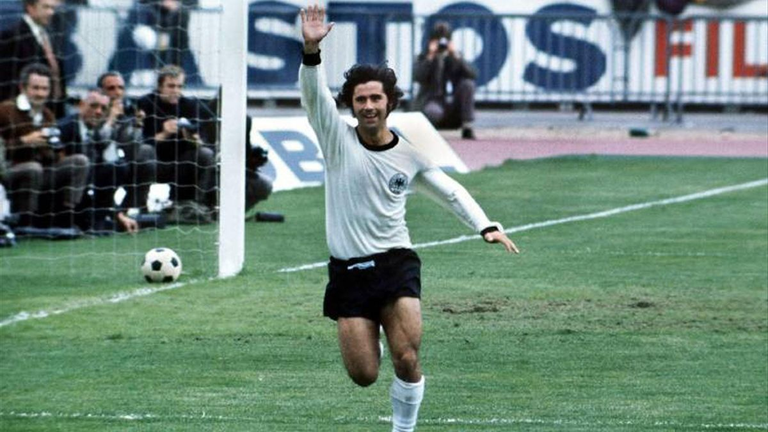
Many analysts and sports journalists maintain that his technique was comparable to that of Marco Van Basten, the splendid player who took his football and his goals all over Europe and who formed the fearsome trident of Arrigo Sacchi's Milan with Ruud Gullit and Frank Rijkaard of the national team in the late eighties.
Gerd Müller marked an era.
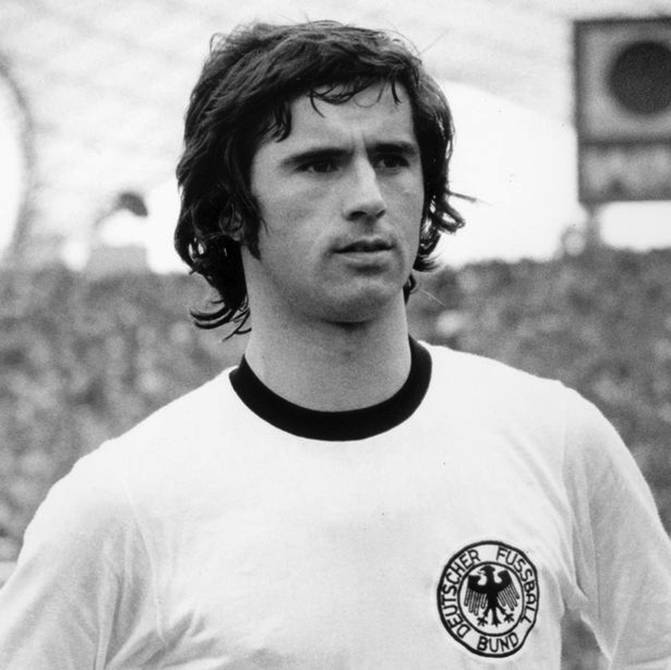
The difference, subtle if you like, but notable if you analyse it in depth, is that the German was actually a much better goal scorer than the Dutchman, as well as having more technical resources.
After starting out at TSV Nördlingen, he moved to Bayern Munich, where he played for fifteen years (1963-1978), and ended his career at Fort Lauderdale Striker in the USA for the last two years, from 1979 to 1981. The Florida team has not played in the North American Soccer League since 2017.
It is safe to say that Gerd Müller was a landmark. He scored an impressive 661 goals for Bayern Munich and Germany in 725 games, averaging 0.91 goals per game during his 18-year career.
The records and the birth of the legend.
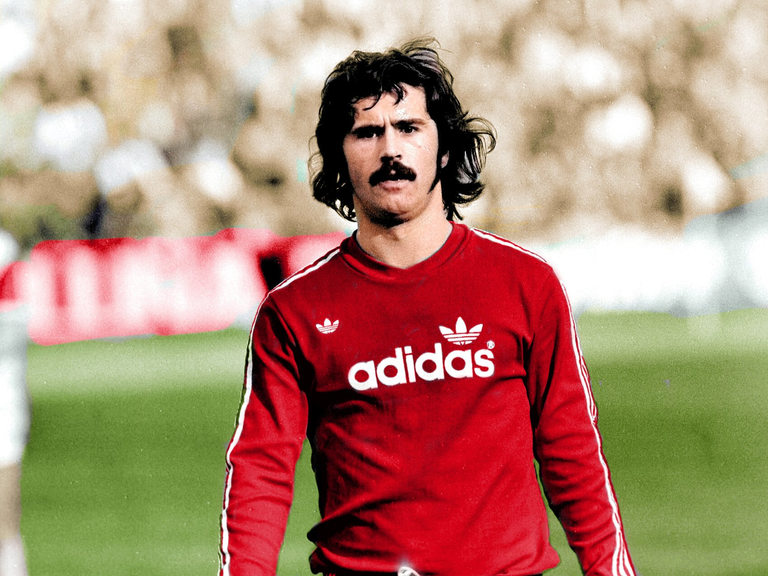
Gerd Müller still holds several records: 365 goals in the Bundesliga, top scorer in the Bundesliga on seven occasions, top scorer for his country's national team (68 goals in 62 games with an average of 1.10 goals per game) until the 2014 World Cup in Brazil, when he was surpassed by Miroslav Klose (Polish nationalised German) who also surpassed the record of the Brazilian Ronaldo as top scorer in the World Cups.
The man dubbed the "Bomber of the Nation" by the German press achieved truly astronomical goalscoring figures. In the 1971/1972 season, for example, he scored a record 40 goals, won four Bundesliga titles, four German Cup titles, one Cup Winners' Cup (a competition that was discontinued in 1999 to make way for the current Champions League) and three European Cup Winners' Cups (now known as the Champions League or UEFA Champions League).
Even at the end of his career, he remained a formidable goalscorer. During his time in the USA with the Fort Lauderdale Strikers, he scored forty goals in eighty games. And he was already close to retirement. An average of 0.50 goals per game at the age of 37.
Ironically, or predestined, Gerd Müller's transfer also became Bayern's launching pad to the highest levels of European and world football.
Bayern, which had always been considered by the Nazis as the "club of the Jews", had suffered ideological persecution of all kinds that had prevented it from being promoted to the Bundesliga and remaining there.
The arrival of Gerd Müller also marks a new era for the German club. He has scored 32 goals in 26 games.
In the match that decided the promotion to the Bundesliga, they faced Tennis Borussia Berlin and defeated them with a resounding 8-0. Other players were part of that team that would become glories and emblems of German football, not only of Bayern Munch, such as goalkeeper Seep Meier and the "Kaiser" Franz Beckenbauer, the axis on which the power of the German team would be established in the future at national and international level.
He left so many memories that it is impossible to compile them all in a single article. Perhaps the most important one in the collective memory is the goal that led to the 2-1 victory against Holland in the memorable final of the 1974 World Cup in Germany.
The German team of Seep Meier, Berti Vogts (the defender who was also a mastiff), Franz Beckenbauer, captain and leader, Paul Breitner, the extraordinary full-back with an African air, facing probably the best Dutch team of all time, illuminated by the immense quality of Johan Cruyff, captain and talent at the service of the team, Johan Neeskens, one of the best midfielders in the world at that time, Reep, Krol and a team where the team was the strength. Everyone attacked and everyone defended.
When Neskeens converted a penalty to give the Netherlands the lead, it seemed all was said and done. However, Paul Breitner and the ever-present Gerd Müller would give the German team the win. And their second World Cup title in history.

Muchos analistas y periodistas especializados en deportes sostienen que su técnica era equiparable a la de Marco Van Basten, aquel espléndido jugador que paseó su fútbol y sus goles por toda Europa y que formó el temible tridente del Milan de Arrigo Sacchi con Ruud Gullit y Frank Rijkaard de la selección. finales de los ochenta.
Gerd Müller marcó una época.
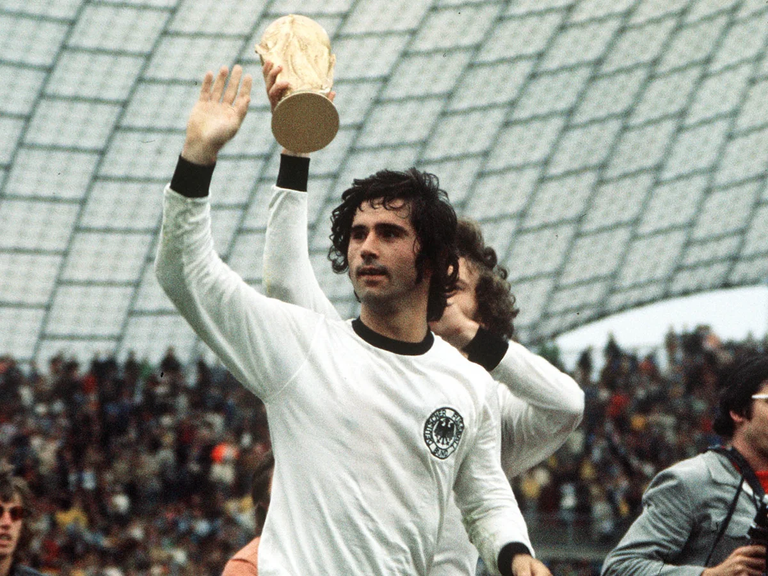
La diferencia, sutil si se quiere, notable si se analiza en profundidad, es que en realidad el alemán fue mucho más goleador que el holandés, a la par de recursos técnicos.
Tras su inicio en el TSV Nördlingen pasó al Bayer Munich donde jugó durante quince años (1963-1978) para cerrar su carrera deportiva en el Fort Lauderdale Striker de USA durante los dos últimos años, de 1979 a 1981, equipo de Florida no juega más tiempo en la North American Soccer League desde 2017.
Podemos decir sin exagerar que Gerd Müller marcó una época. Señaló la impresionante cifra de 661 goles entre el Bayern de Múnich y la selección alemana en 725 partidos, con una media de 0,91 goles por partido en sus dieciocho años de carrera deportiva.
Los registros y el nacimiento de la leyenda.
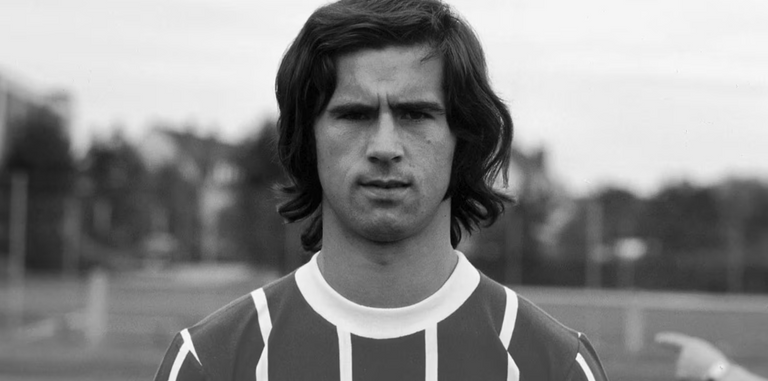
Gerd Müller aún ostenta varios récords: 365 goles en la Bundesliga, máximo goleador de la Bundesliga en siete ocasiones, máximo goleador de la selección de su país (68 goles en 62 partidos con una media de 1,10 goles por partido) hasta el Mundial de Brasil 2014 , cuando fue superado por Miroslav Klose (polaco nacionalizado alemán) quien también superó el récord del brasileño Ronaldo como máximo goleador en las Copas del Mundo.
El denominado "Bombardero de la Nación" por la prensa alemana logró alcanzar cifras verdaderamente estratosféricas como goleador. En la temporada 1971/1972, por ejemplo, marcó un récord de 40 goles, ganó cuatro títulos de la Bundesliga, cuatro títulos de la Copa de Alemania, una Recopa (competición que se suspendió en 1999 para dar paso a la actual Liga de Campeones) y tres Recopas de Europa (ahora conocida como la Liga de Campeones o la Liga de Campeones de la UEFA).
Incluso al final de su carrera, siguió siendo un goleador formidable. Durante su estancia en Estados Unidos con los Fort Lauderdale Strikers marcó cuarenta goles en ochenta partidos. Y ya estaba cerca de la jubilación. Una media de 0,50 goles por partido a los 37 años.
Ironía del destino o de la predestinación, el traspaso de Gerd Müller también se convirtió en la plataforma de lanzamiento del Bayern a los niveles más altos del fútbol europeo y mundial.
El Bayern, que siempre había sido considerado por los nazis como el "club de los judíos", había sufrido persecuciones ideológicas de todo tipo que le habían impedido ascender a la Bundesliga y permanecer en ella.
La llegada de Gerd Müller también marca una nueva era para el club alemán. Marca 32 goles en 26 partidos.
En el partido que definió el ascenso a la Bundesliga, se enfrentó al Tennis Borussia Berlín y los derrotó con un contundente 8-0. Otros jugadores formaron parte de ese equipo que se convertiría en glorias y emblemas del fútbol alemán, no solo del Bayern Munch, como el portero Seep Meier y el "kaiser" Franz Beckenbauer, eje sobre el que se afirmaría el poderío de la selección alemana. en el futuro a nivel nacional y mundial.
Dejó tantos recuerdos que es imposible recopilarlos todos en un solo artículo. En la memoria colectiva está quizás el gol del 2 a 1 ante Holanda en la recordada final del Mundial de Alemania 1974.
El equipo alemán de Seep Meier, Berti Vogts (aquel defensa que también era mastín), Franz Beckenbauer, capitán y líder, Paul Breitner, el extraordinario lateral con aire africano, enfrentado probablemente al mejor equipo holandés de todos los tiempos, iluminados por la inmensa calidad de Johan Cruyff, capitán y talento al servicio del equipo, Johan Neeskens, uno de los mejores centrocampistas del mundo en ese momento, Reep, Krol y un equipo donde el conjunto era la fuerza. Todos atacaban y todos defendían.
Cuando Neskeens anotó un tiro penal para darle la ventaja a Holanda, parecía que todo estaba dicho y hecho. Sin embargo, Paul Breitner y el siempre presente Gerd Müller le darían la victoria al equipo alemán. Y su segundo título mundialista en la historia.
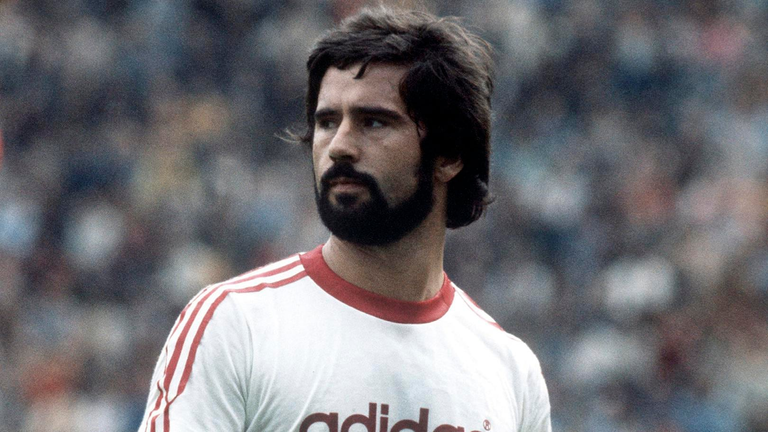
Source imafes / Fuentre imágenes: Bayern Munich.



Gracias por leer. / Thank you for reading.
Los enlaces de mis sitios web / Links to my websites :
